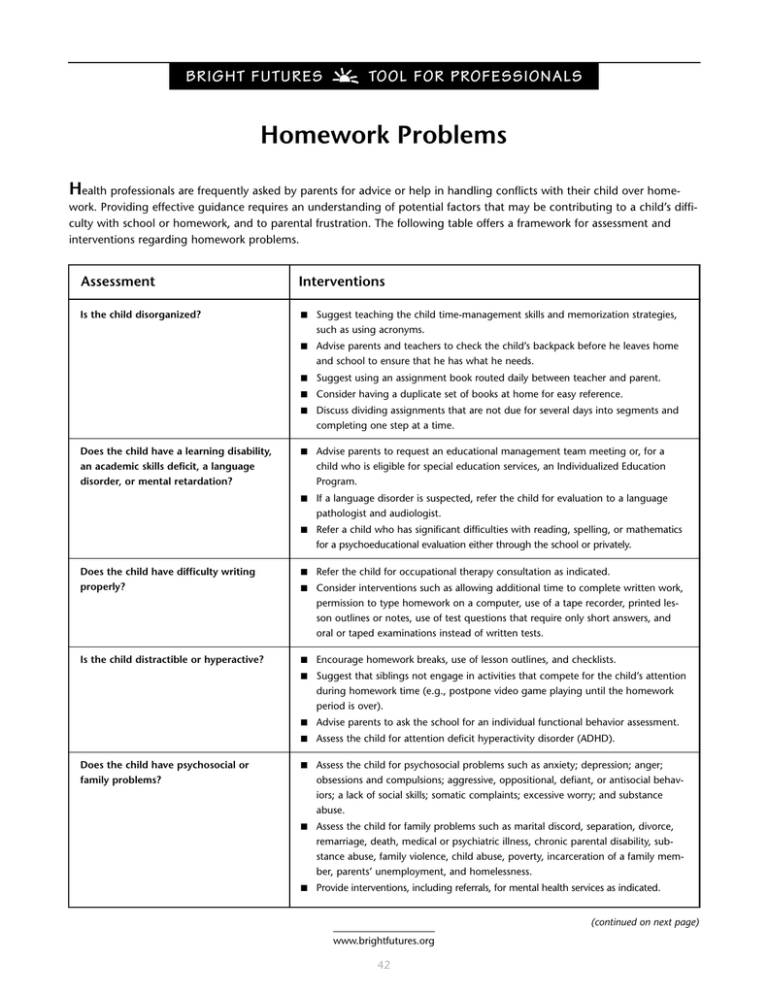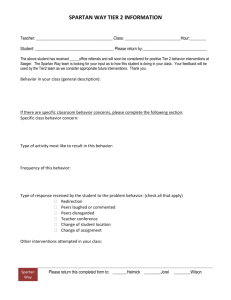Homework Problems
advertisement

BRIGHT FUTURES TOOL FOR PROFESSIONALS Homework Problems Health professionals are frequently asked by parents for advice or help in handling conflicts with their child over homework. Providing effective guidance requires an understanding of potential factors that may be contributing to a child’s difficulty with school or homework, and to parental frustration. The following table offers a framework for assessment and interventions regarding homework problems. Assessment Interventions Is the child disorganized? ■ Suggest teaching the child time-management skills and memorization strategies, such as using acronyms. ■ Advise parents and teachers to check the child’s backpack before he leaves home and school to ensure that he has what he needs. ■ Suggest using an assignment book routed daily between teacher and parent. ■ Consider having a duplicate set of books at home for easy reference. ■ Discuss dividing assignments that are not due for several days into segments and completing one step at a time. ■ Advise parents to request an educational management team meeting or, for a child who is eligible for special education services, an Individualized Education Program. ■ If a language disorder is suspected, refer the child for evaluation to a language pathologist and audiologist. ■ Refer a child who has significant difficulties with reading, spelling, or mathematics for a psychoeducational evaluation either through the school or privately. Does the child have difficulty writing properly? ■ Refer the child for occupational therapy consultation as indicated. ■ Consider interventions such as allowing additional time to complete written work, permission to type homework on a computer, use of a tape recorder, printed lesson outlines or notes, use of test questions that require only short answers, and oral or taped examinations instead of written tests. Is the child distractible or hyperactive? ■ Encourage homework breaks, use of lesson outlines, and checklists. ■ Suggest that siblings not engage in activities that compete for the child’s attention during homework time (e.g., postpone video game playing until the homework period is over). ■ Advise parents to ask the school for an individual functional behavior assessment. ■ Assess the child for attention deficit hyperactivity disorder (ADHD). ■ Assess the child for psychosocial problems such as anxiety; depression; anger; obsessions and compulsions; aggressive, oppositional, defiant, or antisocial behaviors; a lack of social skills; somatic complaints; excessive worry; and substance abuse. ■ Assess the child for family problems such as marital discord, separation, divorce, remarriage, death, medical or psychiatric illness, chronic parental disability, substance abuse, family violence, child abuse, poverty, incarceration of a family member, parents’ unemployment, and homelessness. ■ Provide interventions, including referrals, for mental health services as indicated. Does the child have a learning disability, an academic skills deficit, a language disorder, or mental retardation? Does the child have psychosocial or family problems? (continued on next page) www.brightfutures.org 42 Homework Problems (continued) Assessment Interventions Does the parent-child relationship contribute to the problem? ■ Offer suggestions for improving parent-child interactions regarding homework, such as answering questions, providing a setting conducive to study, helping the child practice spelling and math, accompanying the child to the library, rehearsing oral presentations, helping select and design science fair exhibits, shopping for project materials, and praising the child’s efforts and accomplishments. ■ In situations where parents are unable to assist their child with her homework or where tension between the parents and child over homework is excessive, suggest that an experienced teacher, peer, or mature high school or college student provide extra homework help. A few schools have optional programs in which children complete homework at school after regular hours under the guidance of a teacher. ■ Recognize that, as a health professional, you can offer support, encouragement, and commendation of school success that can improve a child’s motivation, particularly when there are few other positive adult influences in the child’s life. ■ Consider drawing up a homework contract that is developed with both the parents’ and the child’s participation and approval. Keep a copy in the child’s office chart, and give the original to the child to post at home. ■ Assess the child for underlying emotional difficulties. ■ Ask the child about his friends’ attitudes toward school. Peers with positive attitudes toward school success can be a strong influence in fostering constructive educational outcomes, whereas peers with negative attitudes can contribute to decreased interest in schoolwork, underachievement, and the likelihood that the child will eventually drop out of school. ■ Encourage participation in weekend or after-school enrichment programs in the sciences, humanities, and arts that allow the child to explore stimulating topics with high-level instructors and interested peers. These courses can reinforce the idea that brain power is as admirable as muscle power. ■ If teasing or ridicule by peers appears to be contributing to a child’s difficulties, encourage parents to collaborate with the child’s teachers regarding approaches to this problem. ■ Consider referring the child for services that would facilitate social coping (e.g., social skills training, peer mediation). ■ Suggest that the child spend time with a teacher with a hobby similar to her own or with an instructor in a particular area of interest, such as music, art, or physical education. ■ Encourage parents to participate in school activities and to know their child’s teachers. ■ Encourage parents who think their child has too much homework to discuss their concerns with the teacher, principal, or parent-teacher association. ■ If it seems that the child has too many after-school activities, talk to the parents and the child about how to prioritize. Has the child lost the motivation to do well in school? What is the attitude of the child’s peers toward school and homework? How strong a positive influence are the child’s teachers? Does the child have too much homework or too many extracurricular activities? See also Tool for Families: Homework Tips, p. 119. Tool for Health Professionals and Families: My School Sheet, pp. 40, 117. Source: Adapted, with permission, from Green M, Sullivan P, Eichberg C. 1999. Homework conflicts, skirmishes, and wars. Contemporary Pediatrics 16(9):54–73. www.brightfutures.org 43


